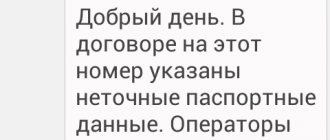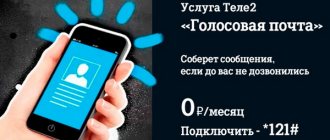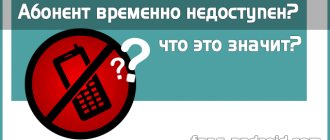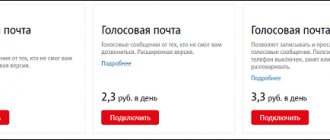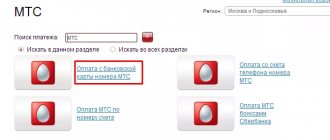Many subscribers of Tele2, Megafon, MTS and other mobile operators have encountered calls and SMS from number 2037 with the text “SIM card check”. After this notification arrives, you may experience problems sending messages and a short-term drop in the cellular network. The following recommendations will allow you to verify your identity and protect yourself from Internet scammers.
What to do if you receive such an SMS message
There is no need to panic if you receive an SMS “SIM card check” from number 2037. Such messages are sent by the operator to make sure that the SIM card belongs to the registered user. Federal law prohibiting the illegal sale of SIM cards requires companies providing mobile phone services to conduct periodic inspections.
After the first message arrives, events can develop according to one of the following scenarios:
- The operator will offer to go through the identity verification procedure by visiting a mobile phone store.
- You can contact customer support and send an email with the information necessary to verify your identity.
- Managers are able to independently verify the subscriber’s identity by checking the available data using the online resources of State Services and the Unified System of Identification and Authentication (USIA).
If you ignore the operator’s request for verification, the SIM card will be blocked after fifteen days. To unlock, you will need to provide the operator with your personal data.
Reviews on the Internet claim that often, under the guise of personal identification, attackers try to steal confidential user information that allows them to gain access to bank cards and virtual wallets. If you suspect spam mailings from scammers, it is recommended to immediately contact the support service of your mobile operator.
How SIM cards are checked
Before the law was adopted, some mobile operators independently began working to eliminate illegally sold SIM cards. Users who fell into this category were informed through messages, electronic assistant and other channels to contact the service center to register the package.
Megafon is also fighting the illegal distribution of SIM cards. All contractors who were found distributing packages from hand to hand without documents were punished and suspended from this activity. If the network system detects such a SIM card, it stops providing services to this subscriber.
There are several amendments to the verification law:
- Each mobile operator undertakes to verify the accuracy of the information that was provided by the client when registering the operator’s package. If any points are unclear, the operator must clarify the information with the subscriber. In case of refusal, the operator must limit the provision of services to this subscriber;
- The law prohibits the distribution of SIM cards without providing the necessary documents when purchasing a package. These rules affect both the purchase of new SIMs and subscribers who have been connected to the network for several years. As you read further, you will understand what the short number 2037 is.
The law banning the sale of operator service packages without presenting a passport has been in effect since 2014. But according to data to date, in many cases the ban was simply ignored. The new law adopts more effective methods of combating “gray” SIM cards, which were often used by fraudsters.
Google verification
The legality of a subscriber's registration can be verified not only by the cellular operator, but also by Google. The link goo.gl/LHCS9W in the message leads to a confirmation form for the phone number associated with the Android device. You will need to follow the steps described in the step-by-step algorithm. After the verification is completed, messages from number 2037 will stop coming. If they come further, you should send an SMS message to number 4424 with the text “OFF 2037”. This option is relevant for MTS. Subscribers of Beeline, Megafon and other mobile operators are recommended to check the information with the support service.
What happens if you don't provide your information?
Initially, operators do not make drastic decisions regarding SIM cards that have been identified as “gray”. The work to identify them and take action has only just begun. And so far such numbers are not blocked. But the adopted law states that if a subscriber, after receiving a request from the operator, does not provide his data within 15 days, he must be disconnected from the network. And no complaints or requests to restore the package will help until the passport is provided.
The same law applies to other types of communications - landline telephone and Internet. If your provider receives a request from the relevant services, he will be forced to check your personal data.
Who else can send SMS messages or call from number 2037
Number 2037 can only be used by service systems. Alerts about debiting funds often come from this number. If you receive an SMS about a decrease in your balance when there are no purchases in online stores, you should check your current subscriptions to online resources. A number of applications and portals activate write-offs automatically without notifying the user. In such a situation, it is recommended to disable unnecessary subscriptions in your personal account and run a device scan with a reliable antivirus application.
What kind of number is this?
Subscribers of MTS, Tele2, Megafon and other operators began to receive unknown messages. The sender of these numbers was someone hiding under the number 2037. The text of this SMS message was: “Checking the SIM card.” After receiving a message from this number, users experienced loss of mobile communications or unsuccessful attempts to send SMS.
It turns out that representatives of mobile companies must verify phone numbers in accordance with the Federal Law prohibiting the illegal trade of SIM cards.
legislation
Is there any basis for such claims, strictly speaking? After all, at some point the user voluntarily performed some action that ensured his place as a victim in the chain (relative to the short number 2037). This is precisely the position that telecom operators adhere to when a subscriber, outraged by the loss of money, begins to search for the truth.
And this is called the federal law of July 23, 2013 N 229-FZ “On Amendments to the Federal Law “On Communications”.
In it, Article 2 of the Basic Law is supplemented with subclause 34.1, which defines what “content services” are.
The legislator made this definition as general as possible, practically fitting into it everything that is not the actual connection. Those. if the user using the phone and through the telecom operator’s channels receives, quote,
...reference, entertainment and (or) other additionally paid information...", gets the opportunity "... to participate in voting, games, competitions and similar events...,
Then he, the user, receives a content service. And it, in turn, being provided with the participation of third parties, falls under the addition of paragraph 5 of Article 44 of the Federal Law “On Communications”, which prescribes a mechanism for protecting the consumer by:
- firstly, the possibility of creating, at his request, a separate account to pay only for content services;
- secondly, the requirement to obtain explicit consent to receive such services;
- thirdly, about comprehensive information, including prices and names of suppliers, about these services before obtaining consent.
Another addition, established by 229-FZ, to paragraph 5 of Article 54 of the Basic Law, states that services provided in violation of any of the above are not subject to payment. And finally, Article 68 of the main communications law is supplemented by paragraph 8, which directly indicates the operator’s responsibility for the implementation of Article 44 (see above).
If it is not possible to use the previous method due to the fact that there is no money in the account, you can use a special service from the operator. This feature is called "Call Me" and allows you to send a free message to any other number. However, he does not necessarily have to be a client of Rostelecom. Cash balances are also not required. It's absolutely free. Follow these steps:
- Open the dialing menu on your phone.
- Enter the combination "*135*NUMBER#" Instead of “NUMBER” there should be the numbers of the phone where the message is sent (without +7 or 8).
- Submit your request. Within a few minutes, a message will be sent to your friend’s number asking you to call him back. Your SIM card number will be indicated as the sender.
What does the message say?
If you receive a message from number 2037, it means that the mobile operator suspects the subscriber of illegally purchasing a starter pack. An automatic system regularly checks clients' passport details. If any suspicions arise, a corresponding notification is sent from the specified number. This operation is carried out in accordance with Russian legislation, which requires mobile operators to serve only subscribers with a confirmed identity. That is, the contract must be drawn up using real passport data.
Telecommunications companies use several methods to verify the identity of subscribers. The most common option is to ask to come to the nearest branch to provide your passport details. Some mobile operators ask you to send a scanned copy of your passport through your personal account on their website. If you have any questions, you can consult technical support. Employees are ready to provide comprehensive information about ways to confirm your identity.
After receiving the automatic mailing, you must call the hotline of your mobile operator.
Some companies strive to simplify customer service, so they independently verify the authenticity of passport data through government portals.
Note! When purchasing a starter package, the seller is required to request passport information from the subscriber. They are entered into the database.
ICCID (ICC) what is it?
All information about the SIM card, including the serial number, is encrypted in ICCID (Integrated Circuit Card IDentifier). This is an international unique identifier containing information about the country, mobile operator, SIM card itself and subscriber number.
What data does it contain?
A knowledgeable person, looking at the 19 ICCID characters (old cards may have a 20-digit code), can determine the country of origin, the organization that issued the card, and the personal SIM card number. It is distributed like this:
- The first two digits are the code for the telecommunications services sector. It's always 89;
- The next group of numbers from one to three indicates the country. For example, for Russia it is 7, for Ukraine – 380;
- Then a group of two to four digits containing the code of the operator who issued the card;
- The block of 11 digits is the SIM card's immediate ID (IID), which does not have a common standard, but is used to link a specific SIM card to the operator's software;
- The last digit or letter is used as an additional check number.
What if you just ignore all these SMS and calls?
Wrong approach. A negligent attitude creates big problems. If you ignore the withdrawal of funds, your losses will become greater. If you don't top up your account, you won't be able to make calls. A virus on your phone is fraught with unpredictable consequences.
Viruses are very dangerous!
If you do not want to identify yourself as a SIM card user, then it will be like this: according to the law, the operator has the right to wait for passport data no more than 15 days from the date the message was sent. After this, your number will be permanently disconnected from the network.
Praying for inclusion, tears, lamentations, threats will not help. Only a passport will help you bring your mobile number back to life. In light of certain laws, it seems that the fight against GRAY SIM cards has begun in earnest.
An acquaintance showed a transcript of the smartphone traffic; his attention was attracted by SMS messages to an unknown MTS number. He was a little worried, fearing that there was a virus on his phone and that his passwords and money were being stolen. We looked together.
This is how he discovered SMS messages to unknown numbers +7(916)896-06-791, +7(916)896-06-792. He noticed them in the My MTS application in the expense control section.
You can view the expense of funds and the service for which funds were debited in the statement or directly in the My MTS application.
I noticed that the phone was sending free SMS to an unknown number. And after viewing the message history, everything fell into place. Here's a look at the messages my friend sent at the time when there were outgoing SMS messages.
If we compare the time of sending messages, we will see that at this time my friend sent a balance request. Yes, the balance request *100# is sent to the operator in the form of an SMS message to MTS service numbers. All other messages coincided in time with the balance request, except that they had other MTS numbers differing in the last digit.
This is how the truth came out about intriguing free messages to an unknown number from MTS.
Rated 2
Loading.
What causes the phone to lose network?
Typically due to wear and tear. You seem to think: “Why is there anything to break?” - but in reality, a SIM card, like any other electronics, can be damaged by:
